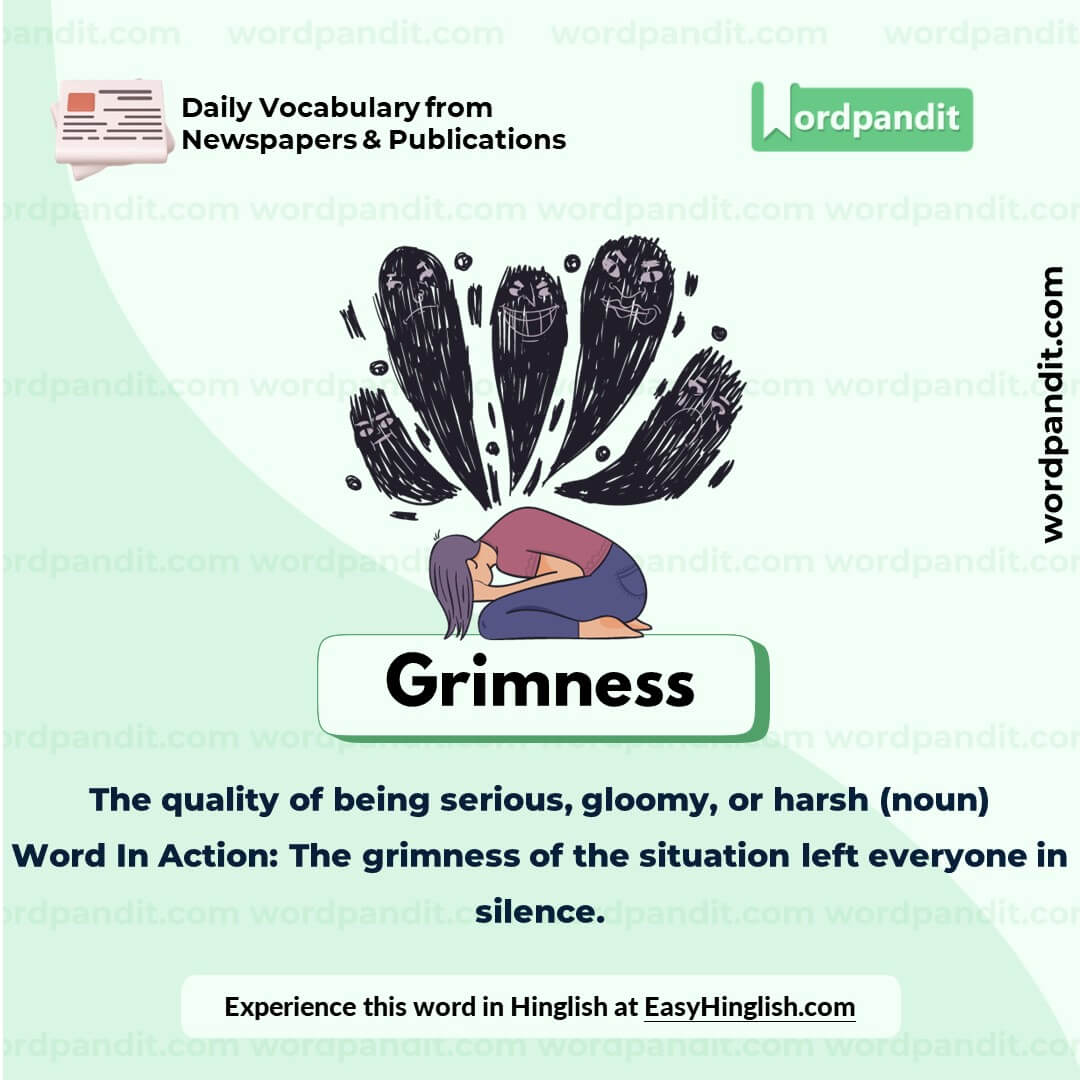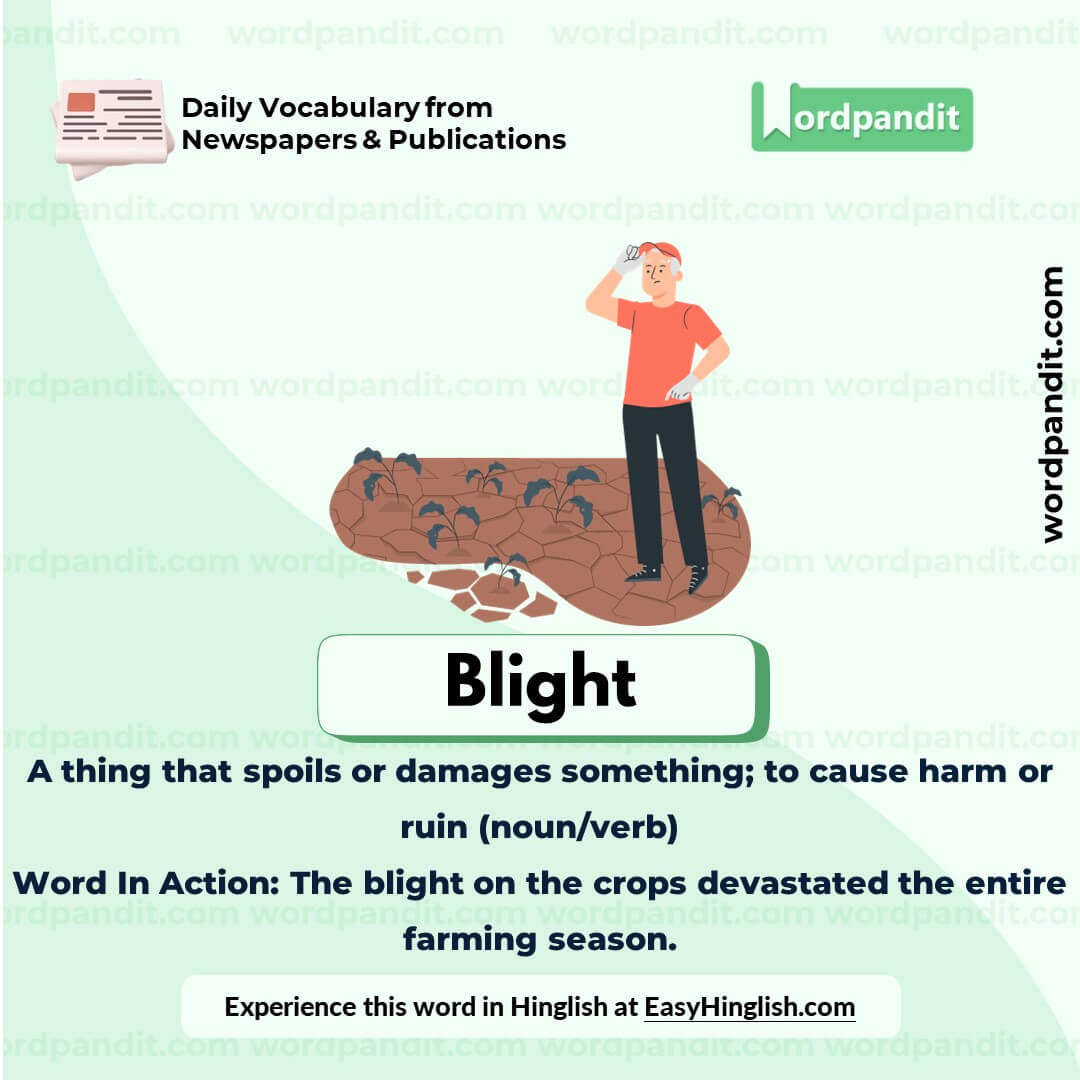Daily Vocabulary from Indian Newspapers and Publications
Welcome to Wordpandit’s Indian Vocabulary Hub
At Wordpandit, we understand the importance of staying rooted in the local context while expanding your language skills. This section focuses on enriching your vocabulary with words and phrases drawn from India’s leading newspapers and publications, ensuring you're learning vocabulary that is practical, relevant, and uniquely Indian.
Why Indian Sources Matter
We believe that the best way to master any language is by immersing yourself in local content. That’s why we carefully curate vocabulary from top Indian publications, including:
- The Hindu
- The Times of India
- The Economic Times
- Hindustan Times
- Live Mint
- The Indian Express
- And many others...
Stay Updated, Stay Relevant
With daily updates from Indian news sources, you’ll be consistently learning words that reflect the trends and shifts in Indian society and culture. Our focus is to provide vocabulary that enhances your understanding of the language in an Indian context.
How Wordpandit Supports Your Goals
Whether you’re preparing for exams, aiming to improve your professional communication, or simply want to stay connected with the latest Indian vocabulary, Wordpandit is here to guide you every step of the way.
Learn with a Practical Approach
Our interactive learning methodology includes real-world examples, engaging activities, and context-specific usage to ensure that every word becomes part of your active vocabulary.
Dive into Indian Vocabulary Today!
Why Choose Wordpandit?
Practical Learning: Focus on words you'll actually encounter in real-world reading, enhancing your comprehension and communication skills.
Diverse Content: From current affairs to scientific breakthroughs, our varied sources expose you to vocabulary across multiple domains.
Effortless Integration: Make Wordpandit a part of your daily routine. Just a few minutes each day can significantly boost your lexicon over time.
Your Path to Vocabulary Mastery
- Visit our Daily Vocabulary section regularly
- Explore new words and their usage in context
- Practice incorporating these words into your own writing and speech
- Track your progress as your vocabulary expands
Start Your Journey Today
Embark on your vocabulary enhancement journey with Wordpandit. By consistently engaging with our daily posts, you'll build a robust vocabulary that serves you well in academic, professional, and personal contexts.
Remember, a word a day keeps linguistic limitations at bay. Make Wordpandit your daily companion in the quest for vocabulary excellence!
WORD-1: Prudence
Context:
"The RBI's monetary policy committee may be able to cut rates by February, if not earlier. The government, on its part, would do well to adhere to the rules of fiscal prudence." - Indian Express
Explanatory Paragraph:
Prudence refers to the ability to exercise sound judgment and foresight, particularly when it comes to making decisions. It involves careful consideration of potential risks and benefits to ensure responsible and well-thought-out actions.
Meaning: The quality of being cautious, wise, and judicious in decision-making (noun)
Pronunciation: PROO-duhns
Difficulty Level: ⭐⭐⭐ (Intermediate)
Etymology: From Latin prudentia, meaning "foresight" or "wisdom"
Synonyms & Antonyms:
Synonyms: caution, discretion, foresight, judiciousness, wisdom
Antonyms: recklessness, imprudence, negligence, thoughtlessness
Usage Examples:
- Exercising prudence, she decided to save a portion of her bonus instead of spending it all.
- The CEO's prudence in managing resources helped the company survive a financial crisis.
- In matters of fiscal policy, prudence often leads to long-term stability.
- His prudence in avoiding unnecessary arguments earned him respect among his peers.
Cultural Reference:
"Prudence, indeed, will dictate that governments long established should not be changed for light and transient causes." - Thomas Jefferson, Declaration of Independence
Think About It:
Why do you think prudence is often considered a key trait in leadership and governance?
Quick Activity:
List three scenarios where demonstrating prudence could lead to better outcomes in daily life.
Memory Tip:
Link "prudence" with "practical sense" to remember its meaning of wise and cautious decision-making.
Real-World Application:
Understanding prudence can help you evaluate risks in investments, plan budgets wisely, and make responsible life choices.
WORD-2: Grimness
Context:
"Disillusioned by the ‘toxic positivity’ culture shaped by millennials, and the ‘you're not doing enough’ prod of the hustle era, Gen Z’s version of bettering life does not lie in sweeping things under the carpet. Instead, they acknowledge the grimness of the current moment while dreaming of a brighter future." - Indian Express
Explanatory Paragraph:
Grimness describes a state of severity, seriousness, or somberness, often in response to harsh or unpleasant realities. It reflects a focus on the gravity of a situation without sugar-coating or downplaying its impact.
Meaning: The quality of being serious, gloomy, or harsh (noun)
Pronunciation: GRIM-ness
Difficulty Level: ⭐⭐ (Basic)
Etymology: From Old English grim, meaning "fierce" or "cruel"
Synonyms & Antonyms:
Synonyms: severity, harshness, solemnity, gloominess
Antonyms: cheerfulness, optimism, levity, brightness
Usage Examples:
- The grimness of the situation became evident when the rescue team encountered the extensive damage.
- Despite the grimness of their financial circumstances, the family remained hopeful for a turnaround.
- The film's grimness captured the harsh realities of life in a war-torn country.
- Her grimness in the face of adversity inspired others to confront their challenges with resilience.
Cultural Reference:
"Grim determination" is a phrase often used to describe characters in literature and film who persist through dire situations, such as Frodo Baggins in Tolkien's *The Lord of the Rings*.
Think About It:
Can acknowledging the grimness of a situation help in finding more realistic and effective solutions?
Quick Activity:
Write a short paragraph describing a historical event where grimness defined the mood but eventually led to positive change.
Memory Tip:
Think of "grimness" as a "grim mess" to associate it with serious or unpleasant situations.
Real-World Application:
Understanding grimness helps to confront challenges with a clear perspective, allowing for effective decision-making in tough times.
WORD-3: Polarisation
Context:
"That Cambridge Dictionary saw 1,30,000 searches for manifest this year tells a story of hope. In an age of loneliness and polarisation, it says: Even though they may not realise it, the young ones will be alright — so long as they can hold on to hope and laughter. If that’s manifestation, so be it." - Indian Express
Explanatory Paragraph:
Polarisation refers to the division of groups or individuals into opposing sides, often resulting in a lack of middle ground or understanding. It can occur in politics, society, or even personal relationships, typically intensifying conflict or creating rigid divides.
Meaning: The process or state of dividing into two contrasting groups or opinions (noun)
Pronunciation: poh-luh-rai-ZAY-shuhn
Difficulty Level: ⭐⭐⭐ (Intermediate)
Etymology: From Medieval Latin polaris, meaning "of or relating to a pole," metaphorically extended to signify division into extremes
Synonyms & Antonyms:
Synonyms: division, separation, bifurcation, dichotomy
Antonyms: unity, harmony, consensus, cohesion
Usage Examples:
- The polarisation of opinions during the election made it difficult to have constructive debates.
- Social media often amplifies polarisation by promoting extreme viewpoints.
- The polarisation within the team hindered their ability to collaborate effectively.
- Efforts to reduce polarisation included fostering dialogue between opposing groups.
Cultural Reference:
In politics, polarisation is frequently discussed in the context of bipartisan divides, such as the sharp ideological split between Democrats and Republicans in the United States.
Think About It:
How can society address the challenges of polarisation without compromising on individual beliefs and values?
Quick Activity:
Identify an instance of polarisation in your community or country. Write about how it affects progress and propose a solution.
Memory Tip:
Think of "polarisation" as "poles apart" to remember its meaning of division into extremes.
Real-World Application:
Recognising polarisation in conversations or media helps you adopt a balanced approach, encouraging understanding rather than division.
WORD-4: Confabulate
Context:
"As the leaders of the world’s major economies confabulate in Rio de Janeiro, Brazil, for the annual G20 summit, unresolved geopolitical tensions continue to blight the global landscape." - The New Indian Express
Explanatory Paragraph:
Confabulate means to engage in informal conversation or discussion. While it often refers to casual chatting, in formal contexts like diplomatic summits, it can mean strategic or purposeful dialogue. The term can also be used in psychology to describe filling memory gaps with fabricated or distorted information.
Meaning: To talk informally or engage in conversation; in psychology, to fabricate imaginary experiences as a compensation for memory loss (verb)
Pronunciation: kuhn-FAB-yuh-layt
Difficulty Level: ⭐⭐⭐ (Intermediate)
Etymology: From Latin confabulatus, past participle of confabulari, meaning "to talk together"
Synonyms & Antonyms:
Synonyms: chat, converse, discuss, talk, parley
Antonyms: silence, quiet, suppress, ignore
Usage Examples:
- The group of friends confabulated over coffee about their weekend plans.
- During the meeting, the executives confabulated privately before announcing their decision.
- Patients with memory disorders may unknowingly confabulate when recounting past events.
- The delegates confabulated late into the night, striving to find a solution to the crisis.
Cultural Reference:
The term "confabulate" is commonly used in diplomacy to describe behind-the-scenes discussions, such as those at major summits like the G20.
Think About It:
How can informal confabulations lead to significant breakthroughs in formal settings like international summits?
Quick Activity:
Write a short dialogue where two characters confabulate about a mysterious event. Use the word in context.
Memory Tip:
Link "confabulate" with "fabricate conversations" to recall its meaning of engaging in dialogue or filling memory gaps.
Real-World Application:
Knowing the word "confabulate" can help you describe both casual chats and significant discussions in professional or diplomatic contexts.
WORD-5: Blight
Context:
"As the leaders of the world’s major economies confabulate in Rio de Janeiro, Brazil, for the annual G20 summit, unresolved geopolitical tensions continue to blight the global landscape." - The New Indian Express
Explanatory Paragraph:
Blight refers to something that causes harm, damage, or a detrimental effect, often leading to ruin or decay. While originally used to describe plant diseases, it has evolved to encompass negative impacts on various aspects of life, such as communities, economies, or environments.
Meaning: A thing that spoils or damages something; to cause harm or ruin (noun/verb)
Pronunciation: blite
Difficulty Level: ⭐⭐ (Basic)
Etymology: Possibly from Old English blicettan, meaning "to wither"
Synonyms & Antonyms:
Synonyms: plague, curse, scourge, bane, affliction
Antonyms: boon, blessing, benefit, advantage
Usage Examples:
- Abandoned buildings became a blight on the once-thriving neighborhood.
- The farmer's crops were devastated by a fungal blight, leaving him with little to harvest.
- Poverty continues to blight the lives of millions across the globe.
- Her sudden illness cast a blight over their holiday plans.
Cultural Reference:
The Irish Potato Famine, caused by a potato blight in the 19th century, is a historical example of how blight can devastate economies and populations.
Think About It:
What steps can societies take to prevent or mitigate the blight of geopolitical tensions on global progress?
Quick Activity:
Identify an example of a "blight" in your local community. Write a few sentences about how it impacts the area and suggest possible solutions.
Memory Tip:
Remember "blight" as something that "blights the light," symbolizing damage or ruin.
Real-World Application:
Understanding the concept of blight is crucial in fields like agriculture, urban planning, and international relations, where it helps address problems effectively.















